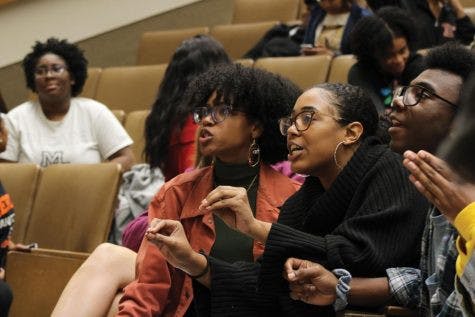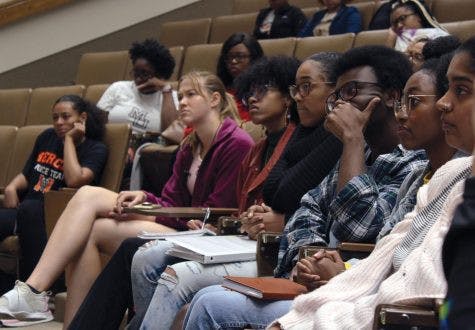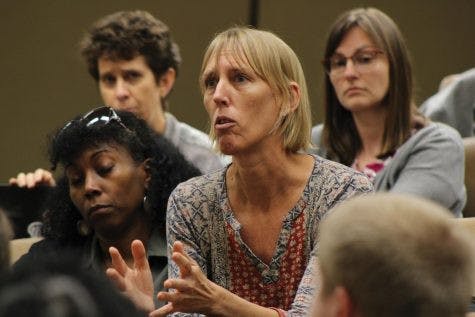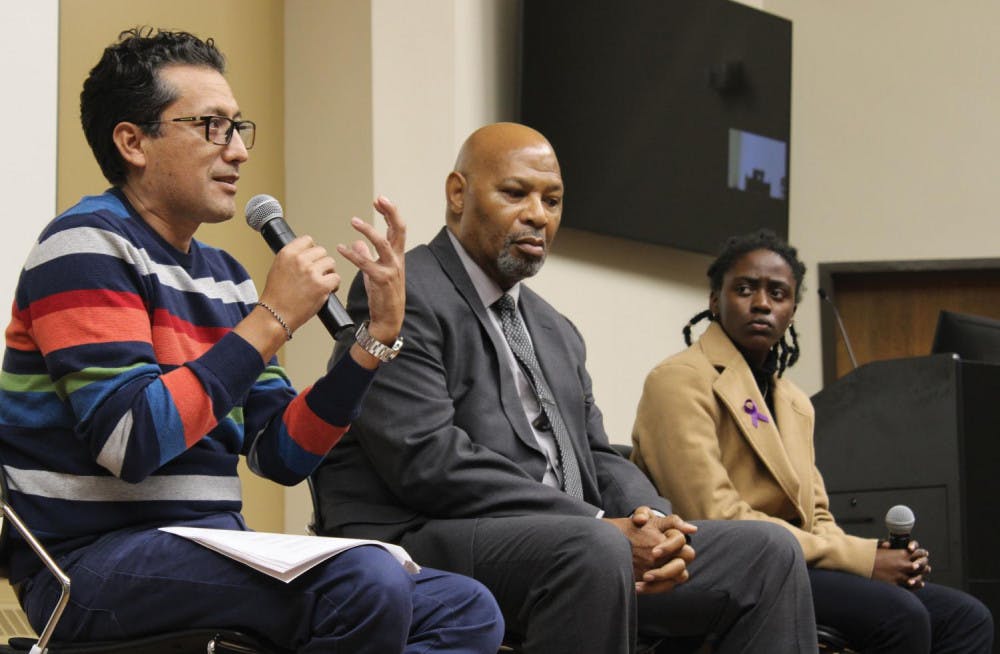A meeting to address statements made by economics professor Antonio Saravia during an Oct. 23 debate was held in the Medical School auditorium on Oct. 28.
The debate, titled “Is Social Justice Just?,” was organized and hosted by Students for Liberty and the Center for the Study of Economics and Liberty. Mercer professors Vasile Stanescu and Antonio Saravia participated in the debate with professor Will Jordan moderating. Stanescu argued that social justice is just, while Saravia took the opposing view.
However, Saravia’s statements during the initial debate included repeated denials of the existence of systemic racism, citing the election of former President Barack Obama as a justification. In response, professor Chester Fontenot organized a meeting for students to voice their concerns about Saravia’s comments.
This follow-up meeting was initially scheduled to take place in a Willingham classroom, but was moved to the Medical School’s auditorium as the size of interested attendees grew. The audience mostly consisted of students, though several professors were also in attendance. Genesis Cooper, a student of Fontenot and Junior Senator of Mercer’s Student Government Association, moderated.
“I realize I’m not in friendly territory today,” Saravia said as the meeting began. He then gave a recap of the comments he made at the debate before the floor was opened for students and faculty to address him.

Cameron Dawkins (left), Yasmeen Hill (middle) and Cameron Wade (right) express their concerns with Antonia Saravia's message.
Several students asked him about his statements on social justice, which Saravia said leads to a “partial application of the law.” He frequently referenced alleged sources that he had on hand, listing off supposed statistics and data that backed up his arguments — however, he did not state exactly who his sources were, how he found them or how the numbers were measured.
When students and professors of color gave firsthand accounts of the racist interactions they have previously — and continually — encountered, Saravia said these were examples of individual racism, not systemic racism.
Systemic, or institutionalized, racism is an embedded form of racism found within political, economic and social institutions. It affects everything from employment rates to income levels to criminal justice, and this widespread, ingrained discrimination makes it more difficult for people of color to have the same opportunities as white Americans.
Mercer student Cameron Wade asked if Saravia knew about the concept of intersectionality after Saravia said that class, not race, was the more prominent factor in incarceration.
“Anybody could be poor,” Wade said. “But poverty disproportionately affects people of color.”
Saravia then said that correlation does not mean causation, again citing his research. Later, he said that because he is Bolivian, he understands what it is to be profiled racially and to come from an economically disadvantaged situation.
“You wouldn’t be sitting up there having this opportunity because minorities, almost all of us in this room, didn’t have the same opportunities,” student Nadia Pressley said. “We weren’t able to appeal to a judge … there had to be some sort of social justice movement to get someone to listen.”
Fontenot spoke after several students and other professors expressed their concerns to Saravia, who repeatedly reiterated his debate arguments.
“I’ve been trying to stay out of this,” Fontenot said. “Being black in America is a constant pain. We hurt all the time.”
He said these issues are not simply theories, research or data.

Cameron Dawkins (left), Yasmeen Hill (middle) and Cameron Wade (right) express their concerns with Antonia Saravia's message.
“The constant assault that we experience, even on this campus, this is why we’re here. This is what you misunderstand, Antonio,” he said.
Michaela Jones, Vice President of Mercer’s SGA, said that she has been stopped by Mercer Police before and asked if she was a student here. She brought up Black Lives Matter and similar movements, saying that those movements fight for her to have equal opportunities.
Later, when speaking of the American enslavement of people of African descent, Saravia compared it to inter-African slavery.
“Black people also enslaved other black people in Africa,” he said.
This statement prompted some students to leave the auditorium. Saravia’s words ignored the plethora of differences between the trans-Atlantic slave trade and slavery within Africa historically, while also implying that all black people are African.
“I don’t think you really get it. I don’t think you understand,” professor Michele Prettyman said. “Everything you’re saying is ahistorical.”
Professor Kedrick Hartfield shared his experiences with police mistreatment.
“I know because I have experienced it my entire life,” he said.
During his second year at Mercer, he was pulled over by police on Riverside Drive, and he remembered “the talk” that many black fathers have with their sons about police. He made sure to turn on all the lights in his car, and he was dressed in a suit and tie. He put his hands out the window. The police officer asked for his license and registration, and when Hartfield reached for his back pocket, the officer drew his gun.

Professor Natalie Bourdon responds to Antonio Saravia's comments.
“Biggest gun I’ve ever seen in my life,” Hartfield said. “I don’t know of one black guy who doesn’t have a story like mine … I don’t know how that’s not systemic.”
Cooper said she felt like after hearing Saravia’s statements that she didn’t want to go to Mercer, to which student Alvaro Garcia said, “Then don’t.”
Cooper left the room, and the crowd expressed their support on her behalf.
“Enough is enough. I’m shutting it down. We’ve reached a point of diminishing returns,” Fontenot said. “This is over.”
Overall, the event lasted for well over an hour and several students stayed after to confront Garcia and speak with Fontenot.
Student organizations are currently finalizing plans on forward action, and this meeting has sparked discussion among faculty members. Check back here for updates.
This story was updated Nov. 4, 2019, to include information about Students for Liberty. Excerpts from an internal Canvas announcement sent to students by economics professor Robi Ragan have also been redacted. The Canvas announcement was critical of Saravia's statements in the debate and was published in The Cluster without Ragan's knowledge, and we regret that decision. Ragan had offered the debate as extra credit in his course and sent the internal Canvas announcement to apologize to students who had attended.
“Being black in America is a constant pain”: Meeting held to address professor’s denial of systemic racism

Professor Antonio Saravia (left) restates his argument as professor Chester Fontenot (middle) and student Genesis Cooper (right) listen.
Marianna Bacallao
Marianna Bacallao
Marianna Bacallao




